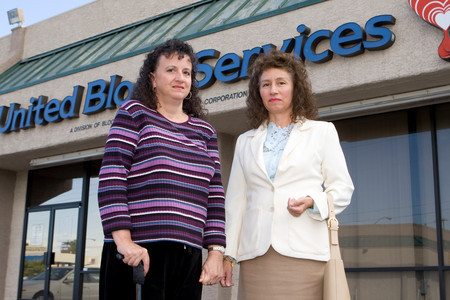Patient pays for using her own blood
When Laura Lipari had surgery on her hip two years ago, United Blood Services drew two pints of her blood for use during the operation -- at no charge.
Blood from a community supply is guaranteed to be 98 percent safe, according to the blood bank. Although those odds might be a surefire bet for most Las Vegas gamblers, they aren't high enough for Lipari.
"I want it to be 100 percent safe, and if I donate my own blood to me, I know it's going to be safe," said Lipari, 44, a Las Vegas resident who lives with her sister and has both Medicaid and Medicare coverage, because of a disability.
When she called United Blood Services to inquire about having blood drawn for the next operation, she was informed the situation had changed.
For Lipari to have her own blood drawn for the surgery, the blood bank was charging $472 per pint, she was told.
Lipari was born with two dislocated hips and has had several corrective surgeries throughout her life. Her next surgery is scheduled for Feb. 3, on her left knee.
Because at least a few pints of blood are required for surgeries where enough blood loss could require a transfusion -- hip and knee replacements included -- she was looking at a cost of nearly $1,000.
Although most insurance companies cover the cost, Lipari has Medicare because of her disability, and Medicare doesn't cover the first three pints of blood drawn for a transfusion, she said.
"I couldn't believe it," she said. "It was free two years ago."
Lipari's personal safety requirements have put her in an expensive, highly unusual circumstance.
If a person needs a blood transfusion, and chooses to take blood from United Blood Services' community supply, there is no charge, according to both the blood bank and Lipari.
The reason a blood bank charges donors to use their own blood is because of the added expenses incurred, said Amy Hutch, a spokeswoman for United Blood Services.
It's a specialized procedure that requires additional shipping costs, a different questionnaire, a doctor's prescription and coordination with the hospital to ensure testing is complete and the blood is delivered to the hospital before the procedure, she said.
In addition, if that unit of blood is not used during surgery, it can't be used in the community supply, and is destroyed.
All the extra work makes the procedure three times as expensive as a donation to the community blood supply, Hutch said.
Although it may seem strange, Hutch compared the situation to mailing a package. If someone mails a letter, there is a small cost. But if that person wants the letter mailed tomorrow with confirmation of receipt, there are extra costs.
"It isn't like anything different happens to the letter. It's the way it's tracked, and the paperwork required that makes an additional charge necessary."
Hutch said the policy to charge donors to use their own blood has been standard for years.
It wasn't until United Blood Services was audited a year ago that its officials discovered they had been inconsistent with collecting a fee, she said.
Hutch said she understood Lipari's frustration, but the policy hadn't changed. Lipari may have been a donor who slipped through the cracks two years ago, she said.
"We're doing a better job of consistently charging (donors) now," she said.
Hutch said the majority of their operation is based on volunteer donations to the community supply.
United Blood Services, a nonprofit organization and the only blood bank in Las Vegas, takes about 270 donations each day for the community supply. There are only four or five cases each month where donors have blood drawn for themselves, she said.
"The point of having a general blood supply is to know it's there, safe and available, when we need it," Hutch said.
A spokeswoman for the American Red Cross confirmed that their organization, which provides hospitals with 43 percent of the transfused blood in the United States, also charges people who donate for themselves. The amount wasn't revealed, but was "very similar to the charge those in Nevada were experiencing."
More outraged than Laura Lipari was her sister, Lidia Lipari, who said their Catholic upbringing was another reason her sister wanted to use her own blood.
"We're not supposed to take other people's blood," Lidia Lipari, 48, said. "That's like putting other people's spirit in your body."
A spokeswoman for the Diocese of Las Vegas said blood transfusions aren't against Catholic beliefs, although it is against the beliefs of Jehovah's Witnesses.
Either way, the Lipari sisters said they are saving for Laura's upcoming surgery, including two possible additional surgeries she may undergo next year.
But despite the high cost, you can't put a price on safety, Laura Lipari said.
"No matter what, I'm not going to use their community blood," she said.
Contact reporter Mike Blasky at mblasky@reviewjournal.com or 702-383-0283.

















